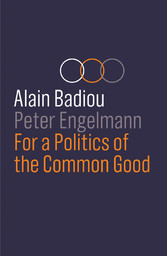
For a Politics of the Common Good

von: Alain Badiou, Peter Engelmann
Polity, 2019
ISBN: 9781509535064
Sprache: Englisch
140 Seiten, Download: 188 KB
Format: EPUB, auch als Online-Lesen
2
The Democratic Discourse
PE You said that the most important thing today is to reach the conviction that something other than capitalism is actually possible. Why do people today find it so hard to imagine an alternative to capitalist society?
AB The big argument is that there’s no modern alternative to capitalism. And that concerns democracy, living in peace, sexual freedom, freedom of morals, the status of women and so forth. All those things are part of the great propaganda of capitalism, because they’re a result of it.
PE So you think that capitalism is responsible for all the things you just listed?
AB Of course capitalism is responsible for them. Definitely.
PE But isn’t that the discourse that legitimizes Western culture?
AB Generally speaking, one could call it the ‘democratic discourse’.
PE Right, but what is the democratic discourse?
AB It’s what I refer to as ‘modernity’, which essentially means a discourse about individual freedoms in the broader sense, that is, personal freedom, freedom of speech, freedom of opinion, freedom of assembly and so on.
PE Gender equality!
AB Exactly, gender equality and whatever other kind of equality. That’s the dominant discourse of the West, there’s no doubt. And this discourse is post-nationalist.
PE So you’re saying that the nationalist discourse has disappeared?
AB No, it hasn’t disappeared, but one can certainly observe a weakening of the nation state. The difference is that nationalism today isn’t taken for granted as a natural passion any more. The nationalist discourse has grown weaker in the West. It’s no longer a dominant discourse as it was in the nineteenth century and a large part of the twentieth, because this discourse dominated Europe until the end of the Second World War. It became weaker after that, and lost further influence through the colonial wars. In France, for example, the colonial wars – the war in Indochina and so on – were the last strong expression of nationalism. And because these wars were ultimately useless and were lost, the nationalist discourse was further weakened as well. But I insist that it’s not dead! The best proof of this is that there are organizations that are trying to revive nationalism in order to fight against globalized capitalism with its help, organizations that pose as anti-capitalists. The modern fascist movements also claim to be against globalized capitalism. In France, for example, the National Front is demanding an exit from the EU and the euro, which would ultimately mean an exit from European capitalism.
So this discourse isn’t dead, but I do think it’s been weakened. And that’s a symptom of the crisis in the dominant discourse that I call the ‘democratic discourse’, the discourse that Hollande championed after the terrorist attacks in Paris: the values of freedom, gender equality, moral freedom and so forth. This is the dominant discourse. And why is it dominant? Because it’s a discourse that can claim, ‘Look! Democracy only exists in the developed and globalized capitalist countries! So capitalism and democracy are inseparable, and you’ll have to accept capitalism whether you like it or not, in the name of democracy! Because you want democracy, you’ll be forced to accept capitalism!’ That’s the dominant argumentation. That’s why one has to invent a modernity that can also be compatible with something other than capitalism. Otherwise the situation will remain as it is. One has to invent a new modernity. That’s the great problem. The socialist states already made a mistake by being archaic and traditionalistic in many ways. They promoted the state, obedience and authority. In the realm of aesthetics and morals they were reactionary. One of the great failures of the socialist states – beside their terrorist and criminal side, which was bad enough – was that in the 1920s or 1930s they were already unable to present themselves as a genuinely modern alternative. They gave the impression of being somehow backward, and that’s not just a matter of the economy. Perhaps this question concerns life in a far more general sense. It’s what gave these countries their reactionary character in many aspects; not only regarding freedoms in the political sense – such as freedom of assembly or freedom of speech – but also in terms of the even more basic freedoms like freedom of movement, the freedom to choose one’s own occupation or personal freedom. In all of these matters the socialist states were completely reactionary. These mistakes won’t be repeated today. Today we’re obliged, in spite of everything, to come to terms with modernity somewhat as it is.
PE Do you have some ideas about this?
AB Oh yes, of course. A whole range of the ideas that capitalism claims for itself could exist equally well in a non-capitalist world. Let’s be honest, there’s really no reason why there shouldn’t be equality between men and women in a communistically-organized world! None of the supposed freedoms that capitalism claims as its own are only conceivable within capitalism. It’s only the despotism of the socialist states that’s responsible for this propaganda. The argumentation is very simple. One says, ‘There were attempts to realize communism in various countries, but this led to the disappearance of the usual democratic freedoms; socialism is therefore bad, and only capitalism is capable of guaranteeing these freedoms.’ That’s the absolute core of contemporary propaganda, and you’re receptive to this propaganda too.
PE Certainly! But that’s precisely what makes our discussion interesting.
AB But if one takes a closer look at the whole thing, if one examines the four points I was referring to before, one won’t see why communism should be tied to these traditional elements – inequality between men and women, the restriction of free movement and the terrible hierarchy of society – by its nature. I’d even say, on the contrary! These are pathological effects caused by the fact that only a small part of the first point was even grasped as part of the communist programme, namely the transition from private property to state property. That was the only innovation people thought politics could achieve. But firstly, that didn’t work, and secondly, this led during the 1980s to the creation of propaganda that still persists after more than thirty years, which claims that capitalism and democracy are necessarily linked.
PE You’re completely right, I’m receptive to it. And do you know why? Because I fought for all those freedoms, for all those things that are connected to capitalist propaganda. I paid the price for it, just like everyone else who fought for them. And all of us experienced the fact that none of the socialist states managed to guarantee these freedoms.
AB Instead of allying yourself with capitalism, you should have held onto the communist hypothesis! Precisely because you were a victim of the socialist states! You’re not a victim of those states because you were persecuted, but because they convinced you that communism is a bad thing!
PE Yes, maybe.
AB But of course! That’s their great victory over you!
PE All right then, you can convince me that they’re wrong.
AB The point isn’t for me to convince you of anything, but to show you how it’s a victory of capitalism. That’s where the problem lies! In the fact that at the moment, it’s definitely not humanity that benefits from the fall of the socialist states, nor the idea of equality or freedom, but rather Western imperialism in the form of unfettered globalized capitalism, whose victory was sealed by the fall of the socialist states. Those are the winners! The 264 people who own as much as three billion others put together. That’s the price that was paid for it!
PE No, one has to differentiate! I don’t see how …
AB But that’s the price we paid for democracy! Of course. The fact that there are five billion people who own nothing at all is the price that had to be paid for your little Western democracy.
PE But I like my little democracy.
AB Yes, so you take that on board. Do you think it’s normal that the rest of humanity doesn’t own anything?
PE No, just listen to me! I’m fighting against it, but I try to separate the two things.
AB You can’t separate them! The privileges of the West are based on the oppression of the rest of the world! There’s no changing that.
PE But we live in the Western world, you too. You can move freely and all the rest.
AB All the better, but I at least try to use this freedom to develop an idea that benefits the others.
PE What makes you think that I don’t feel the same?
AB The fact that you don’t take the critique of this connection between capitalism and democracy to its logical conclusion!
PE Yes, maybe.
AB It’s true. I can understand your position. Most people, myself included, are very...









